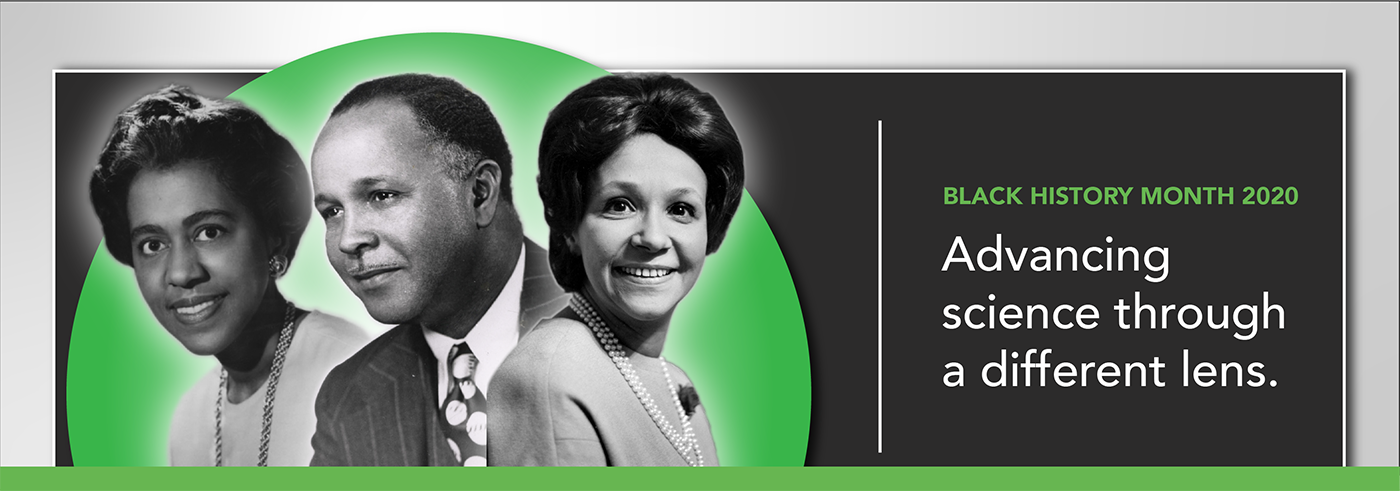Emerging Leaders
The National Institutes of Health (NIH) is deeply committed to developing diverse leaders and administrative professionals in the field of scientific research. Since its inception in 1957, the Management Intern Program has offered resources, targeted training, and hands-on experience to motivate NIH employees interested in pursuing a career in administration and management. Graduates have become some of NIH's most respected administrative managers, including Executive Officers, Administrative Officers, Grants Management Officers, Budget Officers, Human Resource Managers, and Contracting Officers.
As we pay homage to those leaders who have laid the foundation for us, during Black History Month, The Office of Equity, Diversity, and Inclusion (EDI) would like to highlight emerging black administrative leaders. These individuals are poised to lead administrative efforts—focusing on the work that allows scientists to focus on the work of research and discovery.

Tanjier Belton
What led you to your career?
Every position I had at NIH was not intentional; it just happened. I was a Program Analyst for a couple of years at the National Cancer Institute’s Office of Extramural Finance and Information Analysis. I enjoyed and learned a lot while there from many impressive hard workers. Currently, I am a Management Intern (MI), which is a highly selective two-year career development program. One of the awesome perks of the programs is that it allows me to sample many different career paths. I believe the MI program will intentionally lead me to my next career.
Why are administrative careers so important here at the NIH?
Administrative careers are so vital here at NIH because we support the science by giving it the “fuel it needs to burn”. For example, NIH grant management specialists work hard to fund $32 billion a year in grants to enhance life, reduce illness and disability. The budget analysts and the Administrative Officers are involved in the process of funding science as well. Through those initial phases of work brought by those administrative fields help led the way to many scientific breakthroughs as the world’s largest public funder of biomedical research. Those administrative careers mentioned and other unmentioned administrative careers (i.e. Human Resource Specialists, Information Technology Representatives, Secretaries, to name few) are essential as it inadvertently keeps science alive, keeps scientific careers alive, and supports science in which all helps people stay alive longer with a better quality of life.
What advice would you offer someone just starting their career at the NIH?
Think about the mission of NIH when completing your task and no matter how small the assignment may seem—ALWAYS know that it is an important link in NIH’s chain of success. With that in mind, always give 120% by doing your best at all times.
What makes the NIH a special place for you?
The missions of NIH—makes it a special place. Having had key family members die from the diseases that NIH seeks to cure within their 27 institutes makes it a special place and it makes me work especially hard in my loved ones that passed on honor. Another special aspect of NIH is the community-like culture. It is so dynamic as it feels like a small town as they have their own police, fire department, and library to say the least. NIH does important work, but it has a vast array of activities to keep one on an even keel. NIH has a dry cleaner, community chorus, bike share, 5K races, walk-a-thons, gym, soccer —just about anything you could think of NIH has it.

Melbourne Bull, Jr.
Why are administrative careers so important here at the NIH?
Administrative careers at the NIH are important because they support the scientific mission at almost every level. Budget offices allocate congressionally appropriated funds to various offices and labs. Grants offices oversee billions of dollars that spur innovation around the country with NIH’s support. We all rely on our Administrative Offices for onboarding, facilities management and having the tools we need to do our jobs effectively. If the scientific programs are the lifeblood of the NIH, then the thousands of Admin professionals who work here are the veins that keep things moving.
What advice would you offer someone just starting their career at the NIH?
Take advantage of every training opportunity available in your office or institute. One of the benefits of working at the NIH is that career development is encouraged from the moment you enter new employee orientation. Many trainings are free, the NIH Training Center has a dynamic course schedule and most supervisors are willing to help you learn new skills to make you a well-rounded employee.
Why is diversity important at the NIH?
Diversity of thoughts, backgrounds, and experiences are invaluable to any organization. It ensures that new ideas and different perspectives are not only welcomed but encouraged. It also helps to highlight blind spots we all have in interactions with people from various walks of life. Being a part of Health and Human Services means we at NIH serve all humans who come in all different shapes, sizes, and experiences so our workforce must reflect that diversity as well.
What makes the NIH a special place for you?
I always think about my first year in the NIH within the National Institute of Allergy and Infectious Diseases' (NIAID) Division of Microbiology and Infectious Diseases (DMID). It was 2014 and my father’s home country of Sierra Leone, along with a large swath of West Africa, was being ravaged by the Ebola virus. DMID had been working with various organizations to create a vaccine for Ebola for many years and their efforts were relatively successful in curbing the spread of the virus. During that time, I got to support the program officers who worked on that effort and felt like I had made a meaningful contribution to something that would help many people including my family who still lived in Sierra Leone. It helped me to appreciate how many people the NIH helps daily and how we get to be a part of such an impactful agency. That’s what makes the NIH special to me.

Hillary Flowers
What brought you to the NIH?
Like most people, I was looking for a stable career with longevity. To me, what is more interesting is why I stayed: the NIH mission is so amazing, and I’m so thankful every day that I play a tiny piece in supporting scientists who make the world a better place.
Why are administrative careers so important here at the NIH?
The scientists cannot conduct their research without the vast system of support that the NIH offers. Our job as administrators is to clear the path so that scientists can push research forward. From purchasing equipment, planning the workforce, or monitoring the budget, there are so many elements to administration that are mission critical for the scientific community.
What advice would you offer someone just starting their career at the NIH?
It is very easy to get siloed in your own office or division here. I would encourage new employees to push past their local division and explore everything the NIH has to offer on both the administrative and scientific sides. There are so many different people, needs, and methods even in one position description at the NIH. That’s not to mention the vast array of research that is done here.
NIH employees have the unique opportunity to learn about so many elements of the world around us. Before I even joined the Management Intern Program, I scheduled informational interviews with other employees to learn about their careers. Every day, there is a wealth of scientific and administrative seminars that are completely free – take advantage of those. There is so much to learn at this agency.
Why is diversity important at the NIH?
The NIH would not be where it is today without its diverse population. There are so many people here from various backgrounds, ethnicities, or even schools of thought who bring their own experiences to this agency. As a woman of color, it is very encouraging to see leadership that reflects the diversity of this country. Because of the diversity I see all around me, I feel that much more comfortable striving in my own career.

LaShawn Lewis
What led you to your career? Did you choose it? Did it choose you?
While I enjoyed my time as a Management Analyst, I had a long-standing goal of one day becoming an Administrative Officer. After hearing about the Management Internship Program, I jumped at the opportunity to explore a variety of job categories that would be of great value to the AO position. The internship has really given me the opportunity to discover my potential niche within the NIH community.
What advice would you offer someone just starting their career at the NIH?
NIH is a very large agency; it is small at heart. My advice to a person starting a career at NIH is to network as much as possible. Building your network with your IC and beyond can help you gain a breadth of knowledge about the mission of NIH as a whole.
Why is diversity important at the NIH?
Having diversity at NIH allows us as an agency to learn from the brightest minds from a variety of backgrounds. By having diversity in our staffing, we can better serve the diverse community around us.
What makes the NIH a special place for you?
I love NIH because as large as it is, I’ve never felt like just another number. I have been able to build strong connections with a wide array of people with varying backgrounds and expertise. And while it may be beneficial for an office to keep talented staff, I think that NIH values and promotes career advancement. I have personally received support from colleagues and supervisors to pursue my career goals and advance my expertise because, at the end of the day, it benefits the mission of NIH as a whole.





